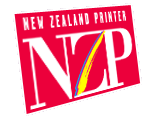
Expert judge Leo Caunter examines a popsicle promo with food-grade ink on its inside, submitted by Auckland firm Huhtamaki.
Tags:
A greater mix of companies have put in entries for the 2006 NZ Pride In Print Awards, indicating that the awards’ strategy of spreading the net wider through the print and packaging entries is paying dividends. Judging of about 900 print and packaging entries for the awards was conducted over three days in Auckland recently. Winners will be announced at awards night in Auckland’s Sky City on June 9.Awards Manager Sue Archibald says that entry levels for the awards had maintained the high level set last year, but that more actual companies had taken the time and effort to submit work.
“We now have 11 categories ranging from gravure and flexo to packaging, web, screen printing, sheetfed, digital, business forms and specialist processes, as well as ‘industry development’ categories such as an environmental award and export award.
“This greater coverage has succeeded in capturing more interest among all the diverse industry sectors, encouraging entries from smaller printers as well as large, and from provincial firms as well as the major city operations.”
A concentrated three days of judging has just been completed in Auckland and Ms Archibald said one trend which had emerged was the increase in annual report entries.
“It is noticeable that this area appears to be on the increase again. We have not reached the heights of the ‘glossies’ of the 1980s but it is encouraging to see companies spending money in this area again.”
Convenor of Judges Grant Letfus says the standards in certain areas reflected the amount of investment the print and packaging industries had put into new equipment.
“There has been significant investment in importing top-of-the range machinery in the last few years. This is being shown in for example some of the sheetfed magazine work we are seeing, where the quality is the highest-ever in seen in Pride In Print.
“It appears printing firms are being rewarded for their investment – but that can only be achieved by a matching quality within the personnel. Equipment still needs to be set up and operated correctly and with skill.”
Mr Letfus says there had been a general rise in standards across most print categories, with a marked rise in quality reported in the web offset category for daily and weekly newspapers, and corrugated packaging also consistently high.
“It appears the drive for quality embodied in Pride In Print is reflecting back to the people on the print floor and they are realising what needs to be done to achieve excellence in the final product.
“In the end it is making it increasingly hard for judges in some categories to find reasons for choosing between the best entries. But that is what we want from Pride In Print.”
Other trends and issues arising from the judging include:
Packaging judges had concerns about some pre-press standards, particularly relating to the handling of digital files which may indicate a need for more training in this area.
Flexo print companies are reflecting the vigorous investment strategies which have given them quality standards which enable them to compete with overseas competitors
Imaginative uses are being made of existing technologies such as heat-sensitive inks in point-of-sale material.
There may be a need for a clearer understanding of the ISO standard on use of the “recycled” logo
Pride In Print winners will be announced at Awards Night in Auckland’s Sky City on June 9. The evening is expected to attract close to 1000 people.






